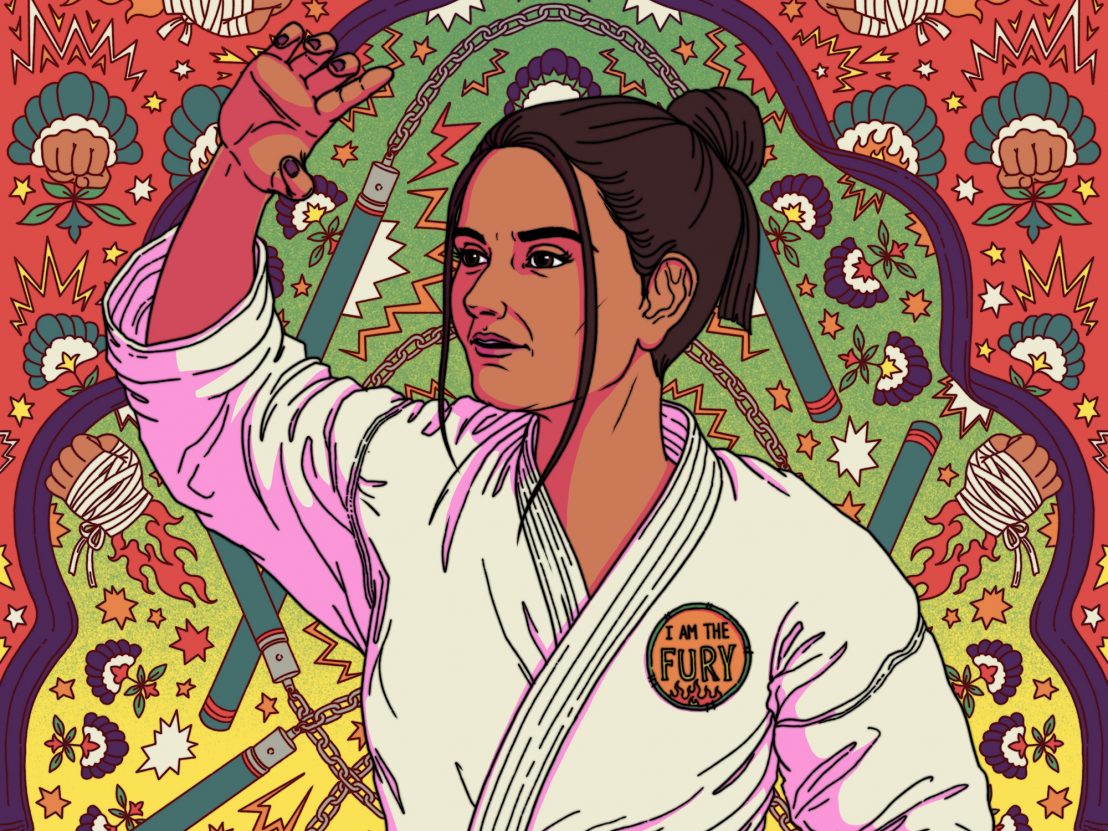
The writer-director behind the furious, hilarious Polite Society explains how her teenage years inspired her to create a coming-of-age action-comedy for the ages.
Nida Manzoor, taking bites of a sugar-dusted cookie in a swanky Soho hotel, politely fudges the F-word. The only time she goes the full F-U-C-K is when scolding herself for being a South Asian good-girl. She’s living the social tension around pleasing others that’s escalated to bizarre proportions in her debut feature comedy, Polite Society. “Biscuits are nice!” is how Ria (Priya Kansara), the heroine, dismisses Saleem, the “nice”, “hotter than God” geneticist-doctor with dastardly nuptial plans on Lena (Ritu Arya), her sister. Niceness, in Polite Society, is evil.
Fortunately, life doesn’t always imitate art, because Manzoor, clean-faced but for winged black eyeliner, is adorable. The sisterly naughtiness of her smash-hit series We Are Lady Parts is in evidence, as we bond over trashy films and a desire to see menstrual blood on screen – Manzoor punctuating her enthusiasm with kittenish growls (“Ugh, the period scene in Souvenir II, is it everything?”) and dainty thwacks of the table.
As with Bridgerton, the ironic period drama that’s as addictive as a box of macaroons, Manzoor’s inveterate good manners enables her to put a zippy spin on generational repressions. You can see why attempts to write working class stereotypes for Eastenders collapsed beneath flights of silliness, and why her costume detail for the first Black Doctor Who was so exacting. The zingy lemon and raspberry pink surfaces of Polite Society erupt with woman-on-woman cartoonish violence. Its gonzo, bathetic energy is offset by the toxic femininity of its queen bee, Raheela (Nimra Bucha), in her coiffed-to-a-scythe’s-edge mane of curls, who is forced to live through her Oedipal son.
LWLies: You were in Singapore till the age of 10. It always struck me as a very sanitised and orderly place. What was it like coming to London
Manzoor: I went to an all-girl’s school, near Shepherd’s Bush Market. It was in London that I felt the divides, where hierarchy and strata really hit me. I experienced bullying in snide ways. As girls and women, a comment about your hair, your dad doesn’t love you – they hurt. I remember fighting in a karate class, girls watching. The pain of the wooden floor against my face, that was one thing, but the girls laughing at me, that really cut. I wanted to make an action film that juxtaposes big, bombastic violence with
these small violences.
How did you navigate the tone of Polite Society? It’s like a punky, playful Bollywood remix of a Jane Austen comedy – but with quite heavy content.
Tone is everything, my favourite thing to mess with. I worked with so many script editors, had audience screenings but making We Are Lady Parts allowed me to find my joy. Before that, I was being asked to write dramas about honour killings, the struggles of being a Muslim woman. I was angry. I was like, ‘I’m going to create something that’s so me: music, punk, comedy, write songs for my siblings, Muslim women, being weird.’ And… Oh, that worked! Polite Society took over 10 years to make. I got so many notes. Even as we got the green light, I had so much self-doubt, like, this film is no good. I was told it doesn’t work by so many high-level Execs. It wasn’t till WALP was a success that, all of a sudden, it’s good? That made me think, I’ve got to trust myself.
We spent ages in the edit, getting the first 10 minutes right, like what is this? It’s a reflection of Ria, wild, over-the-top, a movie that she would have made. It’s like I co-wrote this film with my younger self. It’s a tribute to my DP, Ashley [Connor], the slightly unhinged movement to the camera because it’s a teenage girl’s film: you feel you have to hold on! Talking about films we like, we settled on Park Chan-wook’s Vengeance trilogy – slick and stylized but fizzing.
Sex before marriage, drinking alcohol, it’s not what every Muslim woman does, but it happens, in real life. What were your feelings about representing that?
I want to show my characters transgressing, not shame women who do that. A character like Lena, she would drink. It felt true to her. Growing up, you had to hide these aspects of yourself, these elements of what makes you a good Muslim or not.
The sisters attend a husband-hunting ball in a mansion. There’s a ‘Northanger Abbey’ moment where Ria delves into the secrets of the house. Did you read Jane Austen growing up?
So much Jane Austen. She’s an influence that I didn’t see. ‘Northanger Abbey’ was one of the first I read. But also the Brontës. ‘Wuthering Heights’! Grrr! Just, like, mansions and weird shit.
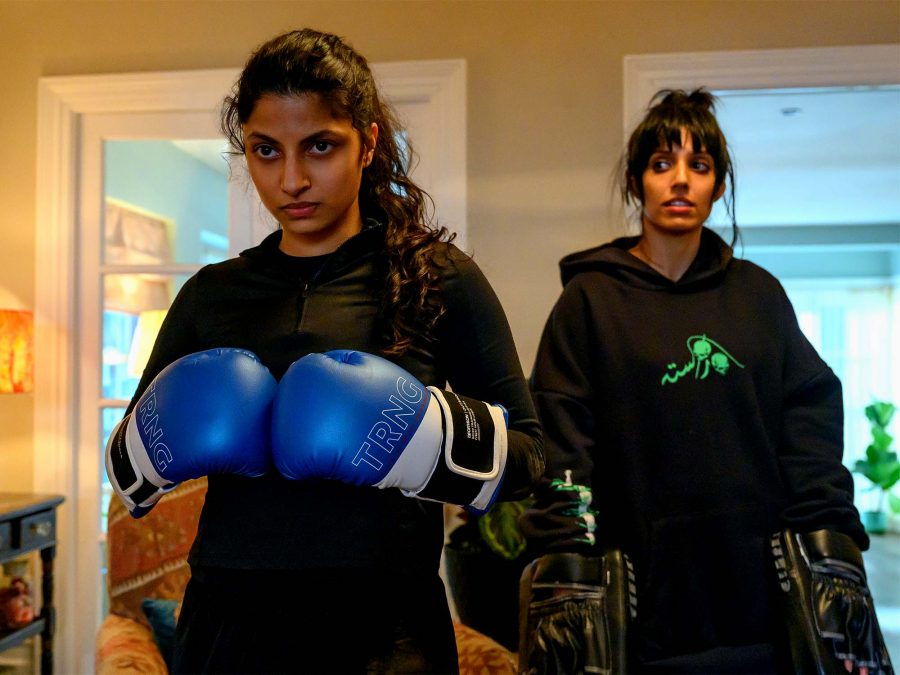
Watching Raheela and her grand house, I wondered, are we South Asian women doomed to repeat the sins of our mothers? Austen’s books are about trapped women who pluckily navigate a barbed social structure. I saw our mothers and aunts do that.
Yep. The reason it’s there in the film is that it’s still real for me. With my mum and my mum’s friends, we, her children, had to look good. It was a pressure on her. That’s still true for me.
Did you grow up being told that, as a brown woman in a white world, you have to be better than everybody else? And did it work?
Whoof. Yeah. Probably. But not to the benefit of my mental health. I’m having to rewire myself now! For me to make a good film, I sacrifice everything to the altar of my work. I was hardwired with: ‘You need to work harder, better, stronger, longer than anyone else.’ I was talking to a writer friend, Ramy [Youssef, of the comedy show, Ramy], and he’s like, ‘We got here through that! We’re in!’ I was like: ‘No, I’m not in, yet, I gotta keep that 100,000 per cent thing.’
I see perfect, ‘graceful’ brown femininity as the flip side of shame inherited from colonialism. The comic-strip energy of your work, the very form of this film, is that a way to push back on that?
That’s so interesting. I see myself, sometimes, performing a kind of woman who’s perfect. When I meet someone for the first time, doing press interviews (not with you, because you’re cool), I’ll be sat up straight, smiling like crazy. And I’m thinking, ‘Stop fucking smiling. Men in interviews, they’re not always smiling, why are you like that?’
But when it comes to my work, I’m breaking that. Comedy is low art. It’s where I get to be free. If I wanted to be the good girl, I’d be doing great-ass dramas, the kind of film the BFI would wanna make. But I get to have fights, write dialogue for an actor like Nimra , make her a motherfucker. Schlock! I love Paul Verhoeven, John Waters… Jane Austen, yes, but I like over-the-top trashiness. Is it bad writing? Possibly. Yay! I wanted it to be absurd, silly.
How knowingly camp were you, in making this film? To be honest, I dread an Asian film about an arranged wedding. It’s something white orientalists like brown women to write about. It can stray into what I call Spicy Mango Exoticism, jolly, cosy.
Spicy Mango territory, ugh, I hear you. I love camp. I grew up going to the cinema with my mum, seeing Kuch Kuch Hota Hai (1998) and Devdas (2002). F’king beautiful. The craft of those Bollywood films… I love that. I want to remix it. Homage it. I was like, grrr, I wanted to see someone tying someone up in dupattas. Reservoir Dogs meets Bollywood. When you see desis on screen, too often it’s clashing colours, ugly. But Lena in her wedding dress is goddamn beautiful, in a Bollywood way, not the Western version of ‘Asian’. The right side of camp, cool, not gross. It took me ages to come round to Raheela’s hot pink pantsuit. Like, is it Spicy Mango? And P.C. Williams, my costume designer was like, ‘No, she’s an iconic villain, in pink with red, f ’k-off boots.’
“I wanted to see someone tying someone up in dupattas. Reservoir Dogs meets Bollywood.” — Nida Manzoor
Yes, let’s talk about Raheela. There’s a subtext, made clear in the plot, that her pampered existence is a torture. She’s like a hot-pink Darth Vader, in a cloak, storming the mansion’s corridors, force-choking…
Yass, the cloak! Oh my god, so much fun. It comes from a truth, too. We’ve encountered women like this in our community, not able to follow their passions or dreams. There’s a real, justified anger. It’s hidden behind smiles and great hair.
A toxic, hyper-femininity, which we are often encouraged to perform.
Hyper-feminine, but dark. There’s something f ’kin’ cool about it, too. I love an angry woman. Again, as South Asian women, we don’t get to rage. To let her be rage-ful, vengeful – honestly, it was freeing. And Nimra [the actor playing Raheela] is sexy. She brought it. Ria and Raheela were like two sides of one woman. To see the light feminine and dark feminine battle it
out… It’s everything, everything!
Do you feel like our glow-up feminism, right now, the kind expressed by Little Simz and Lizzo – when you glow, I glow – is at odds with the so-called post-feminism of the ’80s and ’90s, seen in the competitive, performative older women of this film?
Yes, the aunties have to fight it out, whereas this generation is more about togetherness: without you, I can’t succeed. I wanted it to be a love story between two sisters. When do you get to see two women who love each other like that? People assume they must be gay, as if there’s no other kind of love between women.
There was no encouragement for creativity in my parents’ generation. My brother and sister gave that to me. I have benefitted from that sense of sisterhood with other creatives from a similar background. But I loved directing the scene where the sisters fight. It was cathartic. My sister and I, when we fight, I want to kill her! When you fight with your closest friend, the pain is acute. I was like, this fight needs to be the most violent. Trash everything! A female experience of violence, writ large through the action genre.
There’s a Bollywood dance scene. It’s Devdas, but with dagger eyes and pistol fingers. Does Ria rewatch these movies at home and do the dance moves? Because we’ve all done that.
Oh yeah, I was that girl who would do the moves at every wedding. I danced [in the last few years] at a friend’s wedding to ‘Desi Girl’ from Dostana. [Sings] ‘My desi girl, my desi girl…’ – do you remember that one? Ria’s using this Madhuri Dixit moment to bring in her Kung Fu. I told the choreographer, it should have the playfulness of a teenager. We cast young kids, not a professional dance troupe. It had to be filtered through the character, but a wow moment, not just silly.
Yet this film is on the side of the drop-outs. And the, maybe, mediocre.
Yes, I wanted it to not be the American dream thing. I don’t feel that’s real.
We [South Asian woman] put a pressure on ourselves to be the greatest. I wanted to explore that with Lena’s character. What do you think about the Brown Excellence thing? Is Brown Excellence valuable? Being Dignified, that’s something also applied to us.
Yeah. It is valuable and it isn’t. [We see it in] Saleem’s character. He’s a doctor, but with a dark side. Ria, she wants to be a stuntwoman, the job that gets overlooked, the person who gets thrown, not the flashy, impressive dream. That was important to me.
What would teenage Nida make of you, as you are today?
I never saw myself as a person who pushes things. I’m not Ria. I was more of a good girl, being the right daughter for my parents to tell their friends about. I still have my good girl issues, even though, since Doctor Who, my parents are on board. All my work tries to deal with this good girl, processing the shame, the pressure. The teenage me…I think she would be pretty impressed by herself.
Published 26 Apr 2023
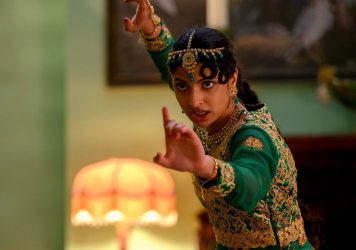
Following the blast of sitcom joy that was We Are Lady Parts, Nida Manzoor takes a giant leap to the big screen with an in-your-face comedy about crane-kicking the face of traditional mores.
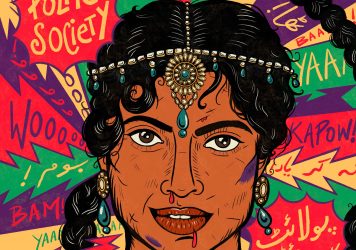
Discover our new issue dedicated to Nida Manzoor’s heiney-kicking comedy about the life of an aspiring South Asian stuntwoman.
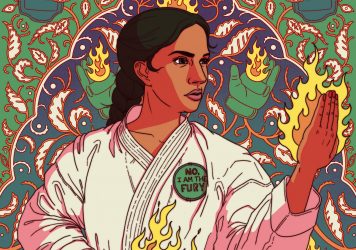
Priya Kansara talks the epic prep required to play the lead role of a teen stuntwoman-in-the-making in Nida Manzoor's Polite Society.